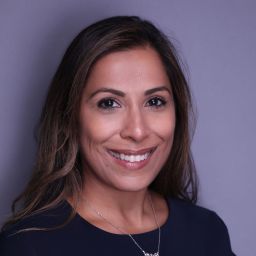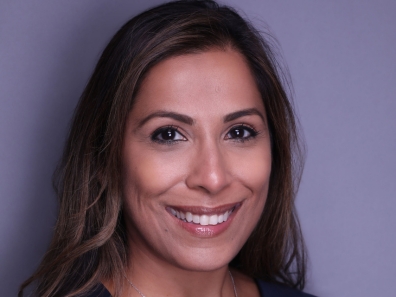
Saaima Khaliq
At one point in her childhood, Saaima Khaliq survived on food stamps. Yet, today, she is the private equity CFO of a firm that manages $30 billion in private equity AUM (assets under management). We had the opportunity to sit down with Saaima and learn more about her life story. She shared how her family's spirit of resilience and an appreciation for every opportunity helped her achieve incredible success.
Tell us about your life growing up.
I was born in Massachusetts but spent the first 10 years of my life in Pakistan. My father received an opportunity to teach and went back to Pakistan with my brother. My mom was pregnant with me at the time, and even though she wasn't an English speaker, she stayed behind with my sister until I was born. I come from a background of very resilient women, even before birth. Right after I was born, my mom flew all the way to Pakistan with me and my sister, then came all the way back to the United States just to get my passport, and then went all the way to Pakistan again. To me, this was huge. For my mother to have done that for me just so I had citizenship is very special to me. I am where I am today because of her resilience and sacrifice.
What was it like moving to the States?
One of the main reasons we moved back to America was education. I grew up in Fairfield, CT, and was fortunate to be in a town that had great public schools. My mother believed we would have a better education in this country, even though it meant moving into a really small house with seven people. Moving here and having to share one bathroom with seven people was an interesting dynamic. I thought, "Wait.
We had so much in Pakistan, and now we have so little." We were living on food stamps at one point. I still remember giving my blue colored food stamp to the cafeteria workers
in the lunch line at school. Other children were buying their lunch, but I had to give this little ticket. Even though I did not speak one word of English, it made me feel embarrassed and that there was something different about me. There was even a point where we were getting canned foods delivered to us because my father was sick and had lost his job. Those were the beginnings of my life here. Still, we were all very motivated to get a great education.
How did you start your career in finance?
I did not grow up with much of a business background. My first job was cleaning the house of my landlord, making $5 an hour when I was 11 years old. Since then, I've been a barista, worked in offices, been a restaurant hostess, worked at Bob's Store for clothing, and even worked at pool halls. I had a wide variety of jobs, but when I started college, I knew that in order to make it, I needed more. I felt like my peers had an edge over me in terms of the business world. But I was good at math and working with numbers. It was something that came naturally to me. Yet, I wasn't familiar with the actual business world. That's when I started researching how I could get better exposure to business and how I could learn about this world on my own. Then, I landed upon INROADS.
I was a sophomore at the University of Connecticut at the time. I thought, "This is fantastic! This organization is geared toward youth like me who come from underrepresented backgrounds." They would give us career training and help us get an internship. The internship was important for me. I wanted to complete it during my sophomore year as opposed to junior year because I felt like I had to learn a lot more.
What was your experience like with INROADS?
It was the best experience. My journey with INROADS was the start of my business career. I received training in terms of business etiquette and knowledge about different career opportunities. INROADS matched me with Arthur Andersen for an internship at a public accounting firm. The training was great, and meeting other people like me was a very interesting experience. I'm still friends with a lot of those same peers who are now very successful in different organizations. Meeting these very motivated individuals who had the same goals, whether they were trying to go into business or other fields, motivated me even more to do better and better. I loved the connectivity that we had with other students, mentors, and managers who supported me along the way. They taught me how to build my resume and interview with Fortune 500 companies.
Tell us about your internship with Arthur Andersen.
It was not very traditional. Normally, you work with clients as an intern in public accounting. However, because I was a sophomore, I worked in the HR department, looking at resumes and completing administrative tasks like filing. I was happy with that and had no issues with it. I didn't think, "I'm in accounting. I should be doing accounting and have client-related work." I was much more focused on getting my foot in the door and getting exposure and experience. INROADS helped me get that, and I was going to make the best of it. So, I developed relationships with HR individuals and even with people in the filing department. I even covered the reception desk and answered phones.
One of the things about my success is that I never felt too good to do something. It just didn't exist because I was very happy to do all of it. For people who have come from a background like mine, I think we have this extra feeling of being blessed and fortunate to be given opportunities that may not have existed for our parents. As long as I felt my work was meaningful and I worked with good people, it was worth it. I believe that's a big lesson.
So, I did really well during that internship, and they brought me back for a second summer. I was provided with some of the best clients, such as Foxwoods, Mohegan Suns, and Starwood Hotels, because I had done a great job in my first internship, even doing non-accounting work. People knew me because I worked as a receptionist. This led me to better opportunities. If I had been someone who felt too egotistic to sit behind a desk, I might not have landed the clients I did.
What were three important things you learned through the INROADS Internship Program?
One of them is actually a funny one - I didn't know how to have a business meal. I didn't grow up in a household where we had formal meals with lots of different types of dishes, spoons, and so many glasses. So, one of our training courses was on the etiquette of going to business lunches and dinners. When you come from an underrepresented background, there's an extra pressure that you must be really good. The last thing I wanted to do was look like a fool or draw negative attention because I was using the wrong fork or the wrong knife. There were many training courses, but that one stood out to me because it was a completely new experience.
Another thing about INROADS that stands out is the network building. As I mentioned earlier, through INROADS, I met some of the most intelligent, hardworking people who are very successful in some of the top organizations out there. I still have that network 20 years later. INROADS alumni have a special bond - we went through the same journey. When you need another INROADS alum, they will be there for you.
The third one would be having a mentor. My mentor was my manager, Phil. Having a mentor who was in business and who was there to stand by your side is a special experience for someone so young and in college. My dad had passed away when I was a teenager, and my mom did not have that type of exposure as she was a nanny. She wasn't able to help me navigate different business situations. So, I had my mentor whom I could talk to about anything related to work.
What legacy would you like to leave behind?
I want to help. I was the first female of color promoted to Managing Director at my firm. I'm helping develop and grow women professionally at the firm. I'm also involved in organizations outside of the firm, such as Women in Fund Finance. Being a woman and a woman of color, as well as having a daughter, it has become a focus of mine to help other women get into finance and stay in finance.
I want to leave behind a world where my daughter has a lot of opportunities and is treated equally. I don't want her to work extra hard compared to someone else. That's how I felt 20 years ago. I was growing up, and people of color had to work extra hard. I don't want that world in the future. My daughter should not be viewed as a person of color, a person of a different religious background, or as a female. Her success should be defined by her talents.
So, I really want to get more involved in this movement and make sure that I leave a world behind where it's about talent and there is no unconscious bias.

